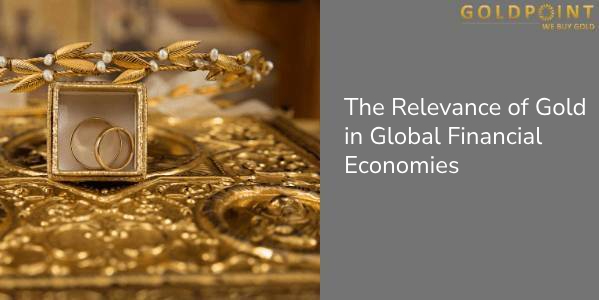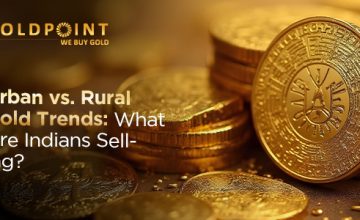
- জানু., 30 2024
- | Sell Gold
The Relevance of Gold in Global Financial Economies
Gold has always been in demand for ages due to its limited supply, inherent value, and valuable retention. The demand for gold as an ornament or as an instrument of investment has always been preferred due to its flexibility, rarity, cultural values, and opulence. Buying and selling gold online has become a piece of cake, thanks to the internet and emerging technology. It’s making a great contribution to the global financial system.
Gold signifies strong influence, richness, and prosperity and has a vivid prominence in the economy of any nation. This precious metal plays a pivotal role in influencing trades, transforming monetary policies, and hedging against inflation and deflation alike.
Gold is also considered a great investment that encourages a financial cover against unforeseen financial risks and acts as a strong portfolio diversifier. Here is a comprehensive guide on the role of gold in economics and financial systems!
Key Characteristics of Gold that Influence the Financial Systems
Here are the top 7 ways in which gold impacts the financial systems of economies:
Gold Reserves – A Symbol of Strength and Wealth
Gold is highly liquid, serves as an effective exchange medium, and can be converted to cash instantly; thus, it acts like a currency in many ways. It stores value and offers stability and security during financial emergencies, currency depreciation, political dishevels, and unforeseen externalities.
Gold still has a universal allure and remains a solid investment that helps maintain, diversify, and increase wealth. It also functions as a security feature against economic disruptions and economic inflation, with its rates mirroring macroeconomic aspects. You can use the gold price calculator to ascertain different rates of gold in different markets and economies. Thus, it influences global economic well-being.
Gold’s Traditional Role in Currency
There was a time when a nation’s currency was directly influenced by a specified gold quantity that helped the economy maintain price equilibrium. However, it dissuaded nations from executing financial guidelines because of which paper notes replaced physical Gold.
This eventually helped regulate inflation. During the transition period, nations were allowed to print their fiat currencies backed up by an equal amount of gold reserves in their kitty. Now, in the modern world, the generation of currency depends on the fiat system and is not backed by Gold or any other physical commodity. This change brought in new challenges but also attributed higher flexibility to economies.
Gold’s Influence On Today’s Currencies
Several people associate an economy’s gold as the major influencing factor when valuing a country’s currency. Undoubtedly, Gold prices have an impact on the value of a fiat currency; however, it cannot be ascertained that it works the other way around. Whether buying and selling gold online or offline, it strongly impacts the strength of an economy’s currency. However, a direct influence of Gold rate changes may or may not impact the currency of an economy.
The Role of Gold in International Trade
Trade stabilises global economies. If a country’s imports are more than its exports, there is a risk of a decline in currency value and vice versa. Similarly, an economy that has rich Gold reserves or exports has a strong currency that can create a trade surplus or mitigate the effect of a trade deficit.
On the contrary, a country will experience an increase in prices of the yellow metal if the reserves are low and imports are at large. Economies largely depend on their currencies to purchase gold; thus, importing gold can create an excess provision of fiat currency and influence the demand and supply of currency, which can further lead to inflation.
Gold’s Influence on Central Bank Reserves
Gold reserves enhance a nation’s financial stability, offer diversification in the financial portfolios of central banks, and work as a strategic investment in an economy. These reserves mitigate threats associated with other traditional investments, enhance a nation’s financial policy, and define monetary policies.
Even in the case of a fiat currency situation, Gold remains influential through market forces, and its prices and trends can easily be analysed and examined by Governments. Gold reserves also influence exchange rates, trade rates, and financial guidelines.
Gold’s Role in Protecting Economies Against Inflation
Gold retains its purchasing power for a long period and is considered a smart asset class investment. Even though other stocks and shares may lose momentum and value because of incessant fluctuations and inflationary markets, gold never fails to retain its stability.
Along with other precious metals, gold has the power to fight inflation and ensure economic stability against financial downturns. For example, Gold mining companies contribute towards an improvement in resource governance, thus inducing economic transformation of countries through skill transfer and local procurement.
Conclusion
Gold is a valuable commodity and is fundamental to an economy’s financial systems. It protects an economy against inflation risks. It is a solid investment, easy to purchase and sell, and has a low maintenance cost and high price stability. It can even garner tax benefits.
The yellow metal helps diversify an economy’s portfolio and secure it against unforeseen emergencies like rising inflation rates. Gold will always continue to play a substantial role in trade markets, foreign exchange markets, and the growth of local and international economies.










